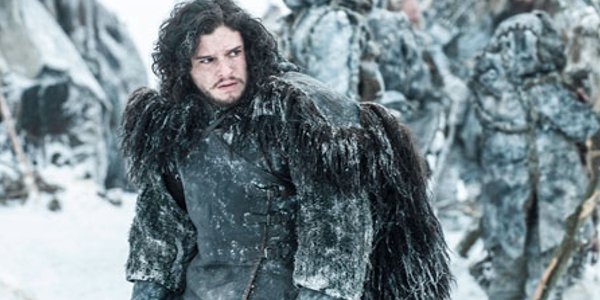“Even the bravest man fears death.” Jorah Mormont
During their obligatory press tour to promote the third season, Game of Thrones showrunners D.B. Weiss and David Benioff revealed to Grantland that when they first pitched the show to writer George R.R. Martin, they were afraid he would only be interested in having his books adapted into films.
Thankfully, Martin was amenable to the idea. But could you imagine if for whatever reason Martin had his heart set on the big screen? Trying to cram this massive amount of plot even into seven to nine four-hour movies would have been a fool’s errand.
And 20 hours in, the show is still visiting new locations, introducing new characters, and exploring new ideas. An entire war has been fought already with a pretty conclusive victory, and the show still gleefully carries on: building and building to the next explosive conflict, or at the very least, the next Tyrion Lannister saggy old man testicles joke.
In a time where every TV fanatic with an internet connection is quick to write about television’s rise at film’s expense, Game of Thrones is the perfect trump card. It’s clear, now more than ever, that television can be preferable to film when telling a story this big, especially as the show’s CGI budget continues to rise (dragons, yo!).
At the same time, it’s also starting to feel like maybe even television as a medium is starting to strain under the weight of this massive fantasy universe week-to-week. Early reviews for season three’s first four episode have been overwhelmingly positive, but have also invariably focused on one aspect of the show that seems off: it’s not really constructed as a TV show. Film clearly was the wrong visual medium for the show but it’s starting to seem more and more like television isn’t big enough either. We may need some unforseen third visual medium that exists out of space and time just to safely cram all this story in satisfactorily.
TV critics get paid to write about individual episodes as complete artistic entities. Sure, they are smaller parts of whole seasons but if executed correctly like on Mad Men or Homeland, an episode should stand on its own as a complete thought. And casual TV viewers expect to be able to talk to their friends or co-workers the next day about an episode of television that either told a full story, advanced the characters in some way or at least held together under some unifying theme. Game of Thrones because of its enormity, however, has no interest in pulling off such episodes and it seems that for the most part, no one really knows what to make of this. Clearly, we’re all still taking time to adjust to the format but three seasons in it’s also very apparent that it’s worth it. Thrones is massively and deservedly popular and while it may not pack the week to week punch of TV’s best shows, its season-long arcs have so far been some of the medium’s finest. And it might be time not to concern ourself whether this story is right for the medium it’s being told in. TV may be buckling a bit to get the story out but it’s the story that’s the sweet narrative heroin that we need and it seems kind of pointless to obsess over the syringe it’s delivered in.
Anyway, onto the first episode.
Things start up fairly inauspiciously. Logic would dictate that when the season two introduced our first good look at the White Walkers, it wouldn’t immediately follow up with said snow zombies immediately laying waste to the Night’s Watch and taking over all of Westeros about five seasons ahead of schedule. But still, it’s hard to call Deus Ex Mormont lighting one random zombie on fire after seeing a whole army of ice monsters a year ago anything but a disappointment.
Thankfully, things move on fairly quickly, if not geographically. Jon Snow arrives at Mance Rayder’s camp, ready to go fully undercover with the Wild folk. Ciaran Hinds makes a good first impression in the role as someone who is stately enough to install himself as king but with a strong rebel streak. It is also refreshing that Rayder is able to see through Jon’s initial lie so clearly. Jonny S’s big doe eyes and gooey earnestness make him one of the world’s worst spy candidates but he picked the absolute most convincing cover-up he could, given his limitations: he really just wants to be a hero. While much attention has been rightfully paid to the CGI dragons going into this year, the depiction of a giant is just as impressive. It’s undoubtedly just an actor in front of a greenscreen or filmed through forced perspective but it feels authentic and physically imposing. And if you were wondering for whatever reason whether Ygritte is still face-meltingly, DNA-exploding, organs-dissolvingly attractive, then the answer is yes.
The end of season two seemed to end fairly conclusively for goings-on in King’s Landing: the Lannister-Tyrell army wins, Joffrey remains on the throne, Cersei and Tywin win, Tyrion loses, but damn it all if I’m not more interested in the continued machinations in the capital than anywhere else. Tyrion’s rise to power last year was exhilarating to watch not just because he is a sympathetic character but because after the death of Ned Stark, it’s inherently exciting to watch the actions of anyone who knows how to play this eponymous game of thrones well. And the newest entrant into this power shuffle is the lovely and clearly intelligent Maergary Tyrell.
After a full year of Loras and Maergary Tyrell being only known as the guy that Renly Baratheon is fucking and the girl that Renly Baratheon should be fucking but can’t bring himself to, the siblings are legitimate players behind the scenes. Claimants have sought power in Westeros through many means but Maergary is following the refreshing and simple strategy of being popular. Keep the poor clothed and fed and it won’t be long before they prefer her over her douchey fiance.
Of course, it’s equally rough to watch Tyrion’s fall from grace. He is a true Game of Thrones character – a relatively decent human being who played the game the right way, making almost no missteps but still ends up at the bottom again due to circumstances beyond his control. The only difference between Tyrion’s reign as Hand of the King and Ned’s is that at least Tyrion got to keep his head. In this episode he mostly lays low while also once again proving the Game of Thrones Theory of Tywin: have any character talk to Tywin for longer than a minute and it’s going to be absolute TV magic. Tyrion’s moment with his father is Tywin at his absolute most brutal and Charles Dance once again at his best.
Speaking of brutal: Stannis, the Mannis is not doing so hot, you guys (aside, of course, from the fires he’s chucking people into). Kudos to the show for revealing relatively early on that Davos survived the Battle of the Blackwater. There wouldn’t have been much of a point in keeping him out of Stannis’ storyline much longer and his lashing out as Melisandre makes things at Dragonstone immediately interesting, where they could have easily fizzled out more post-Blackwater.
The most important development to come out of “Valar Dohaeris,” however, is that our Mother of Dragons seems to be back on track. One of season two’s not-so-secret issues is how quickly Daenerys fell into a “OMG please give me my dragons back nao” rut. Just getting out of Qarth is a huge relief and absolutely everything about Astapor is more vibrant and just plain fun one episode in. Dany has a clear goal to accomplish already this season: secure an army, which should inject her scenes with some much-needed energy. And if that army ends up as the Unsullied led by Ser Barristan Selmy, then bully for us. That is season one’s most badass character hooking up with season three’s most badass 8,000 nameless characters.
Ultimately, as a premiere “Valar Dohaeris” doesn’t stick out much more than last year’s “The North Remembers” and is much less memorable than season one’s “Winter is Coming.” But more importantly it does a noble job of setting up another excellent season of Game of Thrones.
BULLET POINTS FROM HERE ON OUT:
- New locations in the opening credits: Astapor and a burned-out Winterfell. =[
- The best shot of the episode may have been the establishing shot of King’s Landing with children playing in the foreground of destroyed ships in Blackwater Bay.
- Salladhor Saan! You remember him, that crazy pirate who wanted to fuck the queen. Turns out he’s been married four times.
- Not much from Robb here but we do now know that Catelyn is still very much in the dog house…or should I say, direwolf house. I’ll see myself out.
- “I heard you were dead” is Stannis-speak for “Oh my God! Davos! I missed you so much! Come in for a hug. I love you.”
- Where the heck was Arya? We saw Sansa briefly being somewhat flirty with Lord Bangladesh, but her sister was nowhere to be found…
- Did anyone take note of the ridiculous spider that was something straight out of The Matrix?!? Not very Game of Thrones-like.
- “The truth is always either terrible or boring.” I sense some early bitterness, Sansa!
- Tywin says three kingdoms are still in open rebellion. At first glance there appear to be four: The North, The Riverlands, Iron Islands and Dragonstone. But The North and The Riverlands are technically one kingdom under Robb. Stannis’ kingdom would just be Dragonstone, since he must have lost The Stormlands to the Lannisters.
(photo via WhatCulture!)




